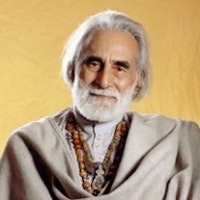Getting in the consciousness of highly attuned beings will trigger off a kind of resonance in us—just as two harps tuned to the same pitch will strike the same chord.
Pir Vilayat Inayat Khan

In The Consciousness
Topic: Prayer, Meditation, & Contemplation
Especially today, it is often the case that trustworthy and experienced spiritual guides are difficult to find. Yet the Sufis have a longstanding practice that provides an antidote to this modern dilemma: turning to humankind’s great masters, saints, or prophets such as Moses, Krishna, Jesus, Kuan Yin, Zoroaster, Melchizedek, Muhammad, and others. They form a hierarchy of mystical transmission reaching into the very highest levels of realization announcing the spiritual dimension of our day and age and indeed future spirituality… Just like tuning the strings of a violin to a note struck on the piano, concentrating on an “ideal being” has the effect of harmonizing that within us which has fallen out of tune with the Divine perspective. While our own spiritual dimension may be latent within us, that of certain great souls is vibrantly awakened. Getting in the consciousness of highly attuned beings will trigger off a kind of resonance in us—just as two harps tuned to the same pitch will strike the same chord.
Pir Vilayat Inayat Khan, born in 1916 in London, was the son of Hazrat Inayat Khan, a notable Sufi mystic who established the Sufi Order International. Raised in France, Pir Vilayat was immersed in both Eastern and Western cultures from a young age. He pursued his education at the prestigious Sorbonne University in Paris, studying psychology and philosophy, and furthered his studies at Oxford University. His artistic inclination led him to study musical composition and cello at the Ecole Normale de Musique in Paris, showcasing his diverse interests and talents.
After serving in the British Royal Navy during World War II, Pir Vilayat embarked on a spiritual quest, traveling extensively in India and the Middle East. His journey enriched his understanding of various religious traditions, culminating in his initiation into the Chishti Sufi Order of India. As a Pir, or spiritual teacher, he returned to the West in the 1950s, where he began disseminating a universal approach to spirituality. His teachings were grounded in meditation and inner exploration, drawing from the wisdom of various religious traditions to create an inclusive, globally relevant spiritual path.
Pir Vilayat’s contributions extended beyond spiritual teaching. A prolific author, he penned over 30 books on Sufism and spirituality, including notable works like "The Essence of Sufism" and "The Way of Illumination." His eloquence as a speaker and lecturer took him around the world, advocating for interfaith dialogue and the integration of diverse religious insights. His work in transpersonal psychology revealed his belief in the potential of psychology to aid in spiritual growth. Pir Vilayat's passing in 2004 marked the end of an era, but his legacy as a bridge between Eastern and Western spiritual traditions continues to inspire. His teachings offer timeless wisdom, guiding people towards inner peace and spiritual transformation, irrespective of their cultural or religious backgrounds.
Ours Is a Way of Light
Khan, Pir Vilayat Inayat. Awakening: a Sufi Experience. J.P. Tarcher/Putnam, 2000. [Pir Vilayat Inayat Khan, Ours is a Way of Light].

Pir Vilayat Inayat Khan
Theme: Meditation and Contemplation

About This Pir Vilayat Inayat Khan Quotation [Commentary]
Pir Vilayat Inayat Khan’s insightful quotation, “Getting in the consciousness of highly attuned beings will trigger off a kind of resonance in us—just as two harps tuned to the same pitch will strike the same chord,” beautifully encapsulates the transformative potential of spiritual resonance. This metaphor vividly illustrates how, through meditation and contemplation, individuals can align their inner vibrations with those of enlightened masters, thus facilitating a profound inner awakening. The context provided broadens this understanding by highlighting the Sufi tradition of connecting with an “ideal being”—a practice that serves as a bridge to the divine, particularly in times when direct guidance from spiritual masters is scarce. It is an evocative reminder that, within the realm of spirituality, the act of tuning our internal frequency to that of those who have reached higher states of consciousness can awaken dormant aspects of our own spiritual nature.
The emphasis on meditation and contemplation as methods for achieving this harmonic resonance further underscores the importance of inner work. Khan’s analogy to musical instruments being tuned to match one another not only speaks to the possibility of spiritual alignment but also to the process itself: deliberate, attentive, and deeply personal. The Sufis’ practice of turning towards the wisdom of past masters underlines a universal truth—that the path to enlightenment is paved with the teachings and experiences of those who have walked it before us. By engaging in meditation and contemplation, we essentially participate in a timeless dialogue with these beings, allowing their insights to resonate within us, harmonizing our inner being with the divine order.
In essence, Khan’s teachings encourage a journey of spiritual discovery and alignment, where meditation and contemplation serve as the conduits for divine connection. This resonant attunement is not merely about seeking external wisdom but is a transformative process of becoming. It reflects a profound understanding of the interconnectedness of all things and the capacity of the human spirit to transcend its limitations. By contemplating the universe and its myriad expressions of divinity, as Khan suggests, we not only draw closer to understanding the essence of Sufism but also embark on a personal quest for enlightenment, guided by the luminous examples of those who embody the highest ideals of spirituality.
Additional Pir Vilayat Inayat Khan Quotes
Resources
Related Quotes
Copyright © 2017 – 2024 LuminaryQuotes.com About Us